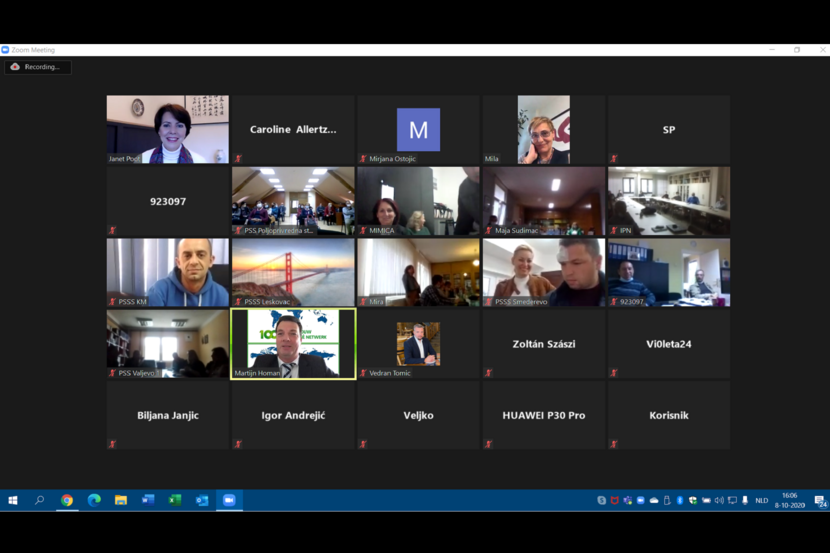The world has changed. Now what? – Knowledge exchange webinar in Serbia
In a joint online webinar by the Netherlands Embassy, the Serbian Ministry of Agriculture and the Serbian Agricultural Advisory Service, the threats, opportunities and its effectiveness for agricultural advisory in the post-COVID-19 economy were discussed

On October 8, the Netherlands Embassy in Belgrade organized in a joint session online webinar titled "Effective Knowledge Exchange: the Key to strengthening Entrepreneurship in the Agriculture Sector" with the participation of members of the Serbian agricultural extension service. The webinar, which was opened by Serbian Assistant Minister for Rural Development Aleksandar Bogicevic and Senior Policy Advisor of the Dutch Ministry of Agriculture, Nature and Food Quality Martijn Homan, featured an extensive presentation on the changing roles of business, leadership and consulting in the new reality after the COVID-19 pandemic by advisory expert Janet Poot of JPC International.
In Serbia, the system of knowledge exchange in the agro sector is based on universities, specialized institutes and the agricultural extension service. The latter represents a network of advisors with specific expertise in certain areas. It is managed by the Ministry of Agriculture, Sector for Rural Development. The Institute for Applied Science in Agriculture regularly implement series of trainings for this network of advisers on behalf of the Ministry. The Netherlands Embassy has a long tradition in cooperating with this expert network in different areas, including the dairy industry, the pig sector, berry fruit cultivation and others. Besides the Serbian Agricultural Advisory Service, numerous private Serbian companies provide expertise on issues connected to their core business, including the use of pesticides, animal feeding, planting materials.
In his opening speech, Assistant Minister Bogicevic underscored the value of cooperation with Dutch experts on various topics and of the support given in knowledge exchange to Serbian advisors. In his welcoming words, Mr. Homan highlighted that the better understanding of the role of entrepreneurship can enable advisors to become more efficient in knowledge exchange, and that the position of farmers and enterprises has become even more important today during the global pandemic, when farmers were facing new challenges.
During the session, economic reality, opportunities and threats that enterprises face today were presented. Agricultural companies are faced with challenges by the climate, economic shocks, biotic and abiotic environmental stress, and the need to appeal to a new generation of farmers – However, the foundations of success can be found in knowledge, skills, technological improvement, the reinforcement of entrepreneurship and supply chains, and in farmers’ own intrinsic ability to adapt to changing circumstances.
One of the key takeaways of Janet Poot’s lecture was that the economic reality irreversibly changed as a result of the pandemic. On the path of adaptation, companies now need to stop reacting in crisis management mode and start moving towards a more risk management mindset. In today’s business environment, continual improvement and improvisation will be key, as mobility is changing, e-commerce is on the rise, and technological adaptation to the digital economy is now crucial. However, a cardinal element of the management of businesses (just as it is with communities, cities, even countries) is purpose-driven reorganization. Brands that are built around clearly defined purposes, with a focus on value proposition, utility for society, will be more successful in the economy of tomorrow.
As Janet Poot explained, this is in line with the emergence of the so-called pop-up economy: An environment in which the economy can halt and restart at a moment’s notice, in which resilience, new business models, and perpetual adaptation will be paramount. This will require reliance on new ways of evaluation. While the dominant mindset today is “how to exit,” i.e., to manage crises and return back to business as usual – the lesson is that there is no more “business as usual,” and the world has irreversibly changed. New business strategies will have to focus on a “how to enter” mindset, prioritizing new approaches and new models over crisis mode and contingency plans, regaining a sense of control in the face of external shocks, relying on effective knowledge sharing and the multi-purposed employment of knowledge, in order to rebuild speed and agility that will enable companies to adapt to the now perpetually shifting environment.
In this new world, the role and skillset of advisors will have to adapt as well. Janet emphasized that instead of narrow problem solving, and planning that react to the perceived status quo, new models of management need to clearly and strongly define purpose and desired adjustment for business planning to be effective. In this process, the role of advisors is to guide, learn and facilitate – but, as highlighted, learning must be the cornerstone focus of every advisor.
In the new world that governments, cities, companies find themselves in, the economic circumstances, the technological possibilities, the means of mobility, the value of production, everything has been transformed considerably. The role of stakeholders, the efficiency of new business models, the risk-managing mindset, and the management of existing knowledge in a multi-purpose way cannot be overstated.